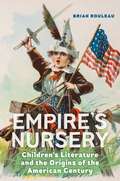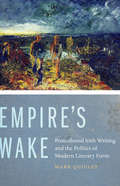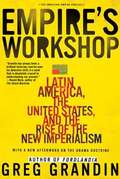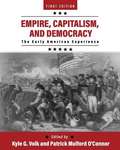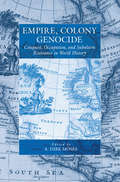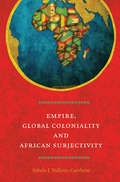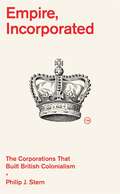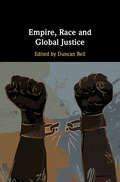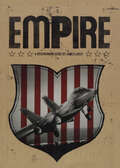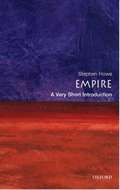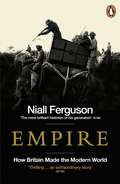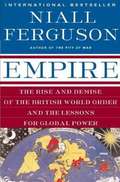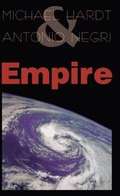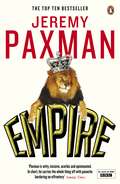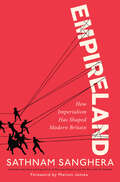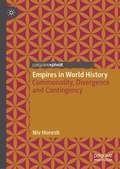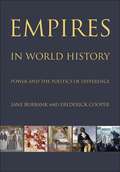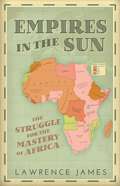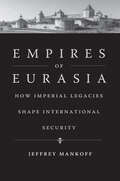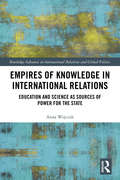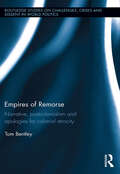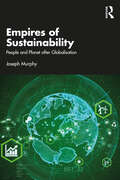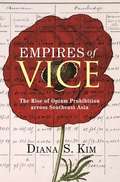- Table View
- List View
Empire's Nursery: Children's Literature and the Origins of the American Century
by Brian RouleauHow children and children’s literature helped build America’s empireAmerica’s empire was not made by adults alone. During the nineteenth and twentieth centuries, young people became essential to its creation. Through children’s literature, authors instilled the idea of America’s power and the importance of its global prominence. As kids eagerly read dime novels, series fiction, pulp magazines, and comic books that dramatized the virtues of empire, they helped entrench a growing belief in America’s indispensability to the international order.Empires more generally require stories to justify their existence. Children’s literature seeded among young people a conviction that their country’s command of a continent (and later the world) was essential to global stability. This genre allowed ardent imperialists to obscure their aggressive agendas with a veneer of harmlessness or fun. The supposedly nonthreatening nature of the child and children’s literature thereby helped to disguise dominion’s unsavory nature.The modern era has been called both the “American Century” and the “Century of the Child.” Brian Rouleau illustrates how those conceptualizations came together by depicting children in their influential role as the junior partners of US imperial enterprise.
Empire's Wake: Postcolonial Irish Writing and the Politics of Modern Literary Form
by Mark QuigleyShedding new light on the rich intellectual and political milieux shaping the divergent legacies of Joyce and Yeats, Empire’s Wake traces how a distinct postcolonial modernism emerged within Irish literature in the late 1920s to contest and extend key aspects of modernist thought and aesthetic innovation at the very moment that the high modernist literary canon was consolidating its influence and prestige.By framing its explorations of postcolonial narrative form against the backdrop of distinct historical moments from the Irish Free State to the Celtic Tiger era, the book charts the different phases of 20th-century postcoloniality in ways that clarify how the comparatively early emergence of the postcolonial in Ireland illuminates the formal shifts accompanying the transition from an age of empire to one of globalization.Bringing together new perspectives on Beckett and Joyce with analyses of the critically neglected works of Sean O’Faoláin, Frank McCourt, and the Blasket autobiographers, Empire’s Wake challenges the notion of a singular “global modernism” and argues for the importance of critically integrating the local and the international dimensions of modernist aesthetics.
Empire's Workshop: Latin America, the United States, and the Rise of the New Imperialism
by Greg GrandinIn a brilliant excavation of long-obscured history, Empire's Workshop shows how Latin America has functioned as a proving ground for American strategies and tactics overseas.
Empire, Capitalism, And Democracy: The Early American Experience
by Patrick O'Connor Kyle VolkEmpire, Capitalism, and Democracy: The Early American Experience documents the history of the United States from the opening of the Atlantic World to the post-Civil War era. The primary sources included were created by women and men who lived during this time and illustrate three interdependent forces that animated the history of early America: empire, capitalism, and democracy. <p><p> Part I of the anthology explores the origins of European contact with America, "new world" civilizations, and the Atlantic slave trade. In Part II, students read sources that address American independence from British rule, early ideas of liberty and equality, the creation of the U.S. Constitution, and the first years of American government. The final part speaks to key issues that divided Americans in the nineteenth century, including market revolution, slavery, western expansion, and ideas of freedom and democracy after the Civil War. <p> With accessible introductions to each primary source and insightful questions to guide students' reading, Empire, Capitalism, and Democracy is an ideal collection for foundational courses in U.S. history.
Empire, Colony, Genocide: Conquest, Occupation, and Subaltern Resistance in World History (War and Genocide #12)
by A. Dirk MosesIn 1944, Raphael Lemkin coined the term "genocide" to describe a foreign occupation that destroyed or permanently crippled a subject population. In this tradition, Empire, Colony, Genocide embeds genocide in the epochal geopolitical transformations of the past 500 years: the European colonization of the globe, the rise and fall of the continental land empires, violent decolonization, and the formation of nation states. It thereby challenges the customary focus on twentieth-century mass crimes and shows that genocide and "ethnic cleansing" have been intrinsic to imperial expansion. The complexity of the colonial encounter is reflected in the contrast between the insurgent identities and genocidal strategies that subaltern peoples sometimes developed to expel the occupiers, and those local elites and creole groups that the occupiers sought to co-opt. Presenting case studies on the Americas, Australia, Africa, Asia, the Ottoman Empire, Imperial Russia, and the Nazi "Third Reich," leading authorities examine the colonial dimension of the genocide concept as well as the imperial systems and discourses that enabled conquest. Empire, Colony, Genocide is a world history of genocide that highlights what Lemkin called "the role of the human group and its tribulations."
Empire, Global Coloniality and African Subjectivity
by Sabelo J. Ndlovu-GatsheniGlobal imperial designs, which have been in place since conquest by western powers, did not suddenly evaporate after decolonization. Global coloniality as a leitmotif of the empire became the order of the day, with its invisible technologies of subjugation continuing to reproduce Africa's subaltern position, a position characterized by perceived deficits ranging from a lack of civilization, a lack of writing and a lack of history to a lack of development, a lack of human rights and a lack of democracy. The author's sharply critical perspective reveals how this epistemology of alterity has kept Africa ensnared within colonial matrices of power, serving to justify external interventions in African affairs, including the interference with liberation struggles and disregard for African positions. Evaluating the quality of African responses and available options, the author opens up a new horizon that includes cognitive justice and new humanism.
Empire, Incorporated: The Corporations That Built British Colonialism
by Philip J. Stern“Brilliant, ambitious, and often surprising. A remarkable contribution to the current global debate about Empire and a small masterpiece of research and conceptual reimagining.”—William Dalrymple, author of The Anarchy: The East India Company, Corporate Violence, and the Pillage of an EmpireAn award-winning historian places the corporation—more than the Crown—at the heart of British colonialism, arguing that companies built and governed global empire, raising questions about public and private power that were just as troubling four hundred years ago as they are today.Across four centuries, from Ireland to India, the Americas to Africa and Australia, British colonialism was above all the business of corporations. Corporations conceived, promoted, financed, and governed overseas expansion, making claims over territory and peoples while ensuring that British and colonial society were invested, quite literally, in their ventures. Colonial companies were also relentlessly controversial, frequently in debt, and prone to failure. The corporation was well-suited to overseas expansion not because it was an inevitable juggernaut but because, like empire itself, it was an elusive contradiction: public and private; person and society; subordinate and autonomous; centralized and diffuse; immortal and precarious; national and cosmopolitan—a legal fiction with very real power.Breaking from traditional histories in which corporations take a supporting role by doing the dirty work of sovereign states in exchange for commercial monopolies, Philip Stern argues that corporations took the lead in global expansion and administration. Whether in sixteenth-century Ireland and North America or the Falklands in the early 1980s, corporations were key players. And, as Empire, Incorporated makes clear, venture colonialism did not cease with the end of empire. Its legacies continue to raise questions about corporate power that are just as relevant today as they were 400 years ago.Challenging conventional wisdom about where power is held on a global scale, Stern complicates the supposedly firm distinction between private enterprise and the state, offering a new history of the British Empire, as well as a new history of the corporation.
Empire, Race and Global Justice
by Duncan BellThe status of boundaries and borders, questions of global poverty and inequality, criteria for the legitimate uses of force, the value of international law, human rights, nationality, sovereignty, migration, territory, and citizenship: debates over these critical issues are central to contemporary understandings of world politics. Bringing together an interdisciplinary range of contributors, including historians, political theorists, lawyers, and international relations scholars, this is the first volume of its kind to explore the racial and imperial dimensions of normative debates over global justice.
Empire-building and Empire-builders: Twelve Studies
by Edward IngramThe twelve studies of empire-building and empire-builders which make up this volume range widely across the dream world that was the British Empire from the late eighteenth century to the Second World War. The essays re-interpret the work of imperial heroes, eminent historians, and fictional heroines. They illustrate the variety of techniques used by British empire-builders and the variety of explanations they gave to account for their sometimes infamous behaviour.
Empire: A Groundwork Guide (Groundwork Guides)
by James LaxerA fascinating look at empires and imperialism, and the new kind of empire the United States has become. An excellent introduction for young adults. The United States presides over the most far-flung imperial system ever established. Empire compares the American Empire to those of the past, finding that much can be learned from the fates of the British, Roman, Chinese, Incan, and Aztec empires. James Laxer draws ominous parallels with the British who discovered too late that empire building ultimately threatens the health of democracy at home. Documenting how the American Empire works and what it means to the rest of the world, Empire asks: Does the American Empire bring stability to a troubled world? Or, like its imperial predecessors, does it impose inequality and oppression on humanity? And what happens when an empire stumbles? "[The Groundwork Guides] are excellent books, mandatory for school libraries and the increasing body of young people prepared to take ownership of the situations and problems previous generations have left them." -- Globe and Mail Correlates to the Common Core State Standards in English Language Arts: CCSS.ELA-LITERACY.RI.6.1 Cite textual evidence to support analysis of what the text says explicitly as well as inferences drawn from the text. CCSS.ELA-LITERACY.RI.6.2 Determine a central idea of a text and how it is conveyed through particular details; provide a summary of the text distinct from personal opinions or judgments. CCSS.ELA-LITERACY.RI.6.3 Analyze in detail how a key individual, event, or idea is introduced, illustrated, and elaborated in a text (e.g., through examples or anecdotes).
Empire: A Very Short Introduction
by Stephen HoweA great deal of the world's history is the history of empires. Indeed it could be said that all history is colonial history, if one takes a broad enough definition and goes far enough back. And although the great historic imperial systems, the land-based Russian one as well as the sea-borne-empires of western European powers, have collapsed during the past half century, their legacies shape almost every aspect of life on a global scale. Meanwhile there is fierce argument, and much speculation, about what has replaced the old territorial empires in world politics. Do the United States and its allies, transnational companies, financial and media institutions, or more broadly the forces of 'globalization', constitute a new imperial system? Stephen Howe interprets the meaning of the idea of 'empire' through the ages, disentangling the multiple uses and abuses of the labels 'empire', 'colonialism', etc., and examines the aftermath of imperialism on the contemporary world.
Empire: How Britain Made the Modern World
by Niall FergusonNiall Ferguson's acclaimed bestseller on the highs and lows of Britain's empire'A remarkably readable précis of the whole British imperial story - triumphs, deceits, decencies, kindnesses, cruelties and all' Jan Morris Once vast swathes of the globe were coloured imperial red and Britannia ruled not just the waves, but the prairies of America, the plains of Asia, the jungles of Africa and the deserts of Arabia. Just how did a small, rainy island in the North Atlantic achieve all this? And why did the empire on which the sun literally never set finally decline and fall? Niall Ferguson's acclaimed Empire brilliantly unfolds the imperial story in all its splendours and its miseries, showing how a gang of buccaneers and gold-diggers planted the seed of the biggest empire in all history - and set the world on the road to modernity.'The most brilliant British historian of his generation ... Ferguson examines the roles of "pirates, planters, missionaries, mandarins, bankers and bankrupts" in the creation of history's largest empire ... he writes with splendid panache ... and a seemingly effortless, debonair wit' Andrew Roberts 'Dazzling ... wonderfully readable' New York Review of Books'Empire is a pleasure to read and brims with insights and intelligence' Sunday Times
Empire: The Rise and Demise of the British World Order and the Lessons for Global Power
by Niall FergusonThis grand narrative history of the world's first experiment in globalization offers lessons for an ever-expanding American Empire--from England's most talented young historian.
Empire: War And Democracy In The Age Of Empire
by Michael Hardt Antonio NegriImperialism as we knew it may be no more, but Empire is alive and well. It is, as Michael Hardt and Antonio Negri demonstrate in this bold work, the new political order of globalization. Their book shows how this emerging Empire is fundamentally different from the imperialism of European dominance and capitalist expansion in previous eras. Rather, today's Empire draws on elements of U.S. constitutionalism, with its tradition of hybrid identities and expanding frontiers. More than analysis, Empire is also an unabashedly utopian work of political philosophy.
Empire: What Ruling the World Did to the British
by Jeremy PaxmanFrom the bestselling author of The English comes Empire, Jeremy Paxman's history of the British Empire accompanied by a flagship 5-part BBC TV series, for readers of Simon Schama and Andrew Marr.The influence of the British Empire is everywhere, from the very existence of the United Kingdom to the ethnic composition of our cities. It affects everything, from Prime Ministers' decisions to send troops to war to the adventurers we admire. From the sports we think we're good at to the architecture of our buildings; the way we travel to the way we trade; the hopeless losers we will on, and the food we hunger for, the empire is never very far away.In this acute and witty analysis, Jeremy Paxman goes to the very heart of empire. As he describes the selection process for colonial officers ('intended to weed out the cad, the feeble and the too clever') the importance of sport, the sweating domestic life of the colonial officer's wife ('the challenge with cooking meat was "to grasp the fleeting moment between toughness and putrefaction when the joint may possibly prove eatable"') and the crazed end for General Gordon of Khartoum, Paxman brings brilliantly to life the tragedy and comedy of Empire and reveals its profound and lasting effect on our nation and ourselves.'Paxman is witty, incisive, acerbic and opinionated . . . In short, he carries the whole thing off with panache bordering on effrontery' Piers Brendon, Sunday Times 'Paxman is a magnificent historian, and Empire may be remembered as his finest work' Independent on SundayJeremy Paxman was born in Yorkshire and educated at Cambridge. He is an award-winning journalist who spent ten years reporting from overseas, notably for Panorama. He is the author of five books including The English. He is the presenter of Newsnight and University Challenge and has presented BBC documentaries on various subjects including Victorian art and Wilfred Owen.
Empireland: How Imperialism Has Shaped Modern Britain
by Sathnam SangheraA best-selling journalist&’s illuminating tour through the hidden legacies and modern realities of British empire that exposes how much of the present-day United Kingdom is actually rooted in its colonial past. Empireland boldly and lucidly makes the case that in order to understand America, we must first understand British imperialism."Empireland is brilliantly written, deeply researched and massively important. It&’ll stay in your head for years.&” —John Oliver, Emmy Award-winning host of "Last Week Tonight with John Oliver"With a new introduction by the author and a foreword by Booker Prize-winner Marlon JamesEmpire—whether British or otherwise—informs nearly everything we do. From common thought to our daily routines; from the foundations of social safety nets to the realities of racism; and from the distrust of public intellectuals to the exceptionalism that permeates immigration debates, the Brexit campaign and the global reckonings with controversial memorials, Empireland shows how the pernicious legacy of Western imperialism undergirds our everyday lives, yet remains shockingly obscured from view.In accessible, witty prose, award-winning journalist and best-selling author Sathnam Sanghera traces this legacy back to its source, exposing how—in both profound and innocuous ways—imperial domination has shaped the United Kingdom we know today. Sanghera connects the historical dots across continents and seas to show how the shadows of a colonial past still linger over modern-day Britain and how the world, in turn, was shaped by Britain&’s looming hand. The implications, of course, extend to Britain&’s most notorious former colony turned imperial power: the United States of America, which prides itself for its maverick soul and yet seems to have inherited all the ambition, brutality and exceptional thinking of its parent.Empireland is a revelatory and lucid work of political history that offers a sobering appraisal of the past so we may move toward a more just future.
Empires and Bureaucracy in World History
by Crooks, Peter and Parsons, Timothy H. Peter Crooks Timothy H. ParsonsHow did empires rule different peoples across vast expanses of space and time? And how did small numbers of imperial bureaucrats govern large numbers of subordinated peoples? Empires and Bureaucracy in World History seeks answers to these fundamental problems in imperial studies by exploring the power and limits of bureaucracy. The book is pioneering in bringing together historians of antiquity and the Middle Ages with scholars of post-medieval European empires, while a genuinely world-historical perspective is provided by chapters on China, the Incas and the Ottomans. The editors identify a paradox in how bureaucracy operated on the scale of empires and so help explain why some empires endured for centuries while, in the contemporary world, empires fail almost before they begin. By adopting a cross-chronological and world-historical approach, the book challenges the abiding association of bureaucratic rationality with 'modernity' and the so-called 'Rise of the West'.
Empires in World History: Commonality, Divergence and Contingency
by Niv HoreshThis study focuses on Empires, from an economic historical perspective. In doing so, it relates current debates in international relations (IR) and politics to the vexed legacy of empires in the past.The book includes analyses of the comparative scholarly literature on Empire in Antiquity, and Empire in the Early Modern and Modern Ages, asking the question if the United Sates is an Empire, and if China an emerging Empire.It contributes to the field given its interdisciplinarity, bringing together both historical and IR insights into world systems in times past. In addition it draws out four key points of separateness between pre-modern and modern empires, and emphases specific economic data. Further to that, the book advances the notion of the emergence of “empires from within” in the 21st century, that is nation-states becoming more multi-ethnic while often stepping back from globalization. And finally it offers future scenarios for the evolution of empires in a Schumpeterian post-industrial world.
Empires in World History: Power and the Politics of Difference
by Frederick Cooper Jane BurbankEmpires--vast states of territories and peoples united by force and ambition--have dominated the political landscape for more than two millennia. Empires in World History departs from conventional European and nation-centered perspectives to take a remarkable look at how empires relied on diversity to shape the global order. Beginning with ancient Rome and China and continuing across Asia, Europe, the Americas, and Africa, Jane Burbank and Frederick Cooper examine empires' conquests, rivalries, and strategies of domination--with an emphasis on how empires accommodated, created, and manipulated differences among populations. Burbank and Cooper examine Rome and China from the third century BCE, empires that sustained state power for centuries. They delve into the militant monotheism of Byzantium, the Islamic Caliphates, and the short-lived Carolingians, as well as the pragmatically tolerant rule of the Mongols and Ottomans, who combined religious protection with the politics of loyalty. Burbank and Cooper discuss the influence of empire on capitalism and popular sovereignty, the limitations and instability of Europe's colonial projects, Russia's repertoire of exploitation and differentiation, as well as the "empire of liberty"--devised by American revolutionaries and later extended across a continent and beyond. With its investigation into the relationship between diversity and imperial states, Empires in World History offers a fresh approach to understanding the impact of empires on the past and present.
Empires in the Sun: The Struggle for the Mastery of Africa
by Lawrence JamesIn this compelling history of the men and ideas that radically changed the course of world history, Lawrence James investigates and analyses how, within a hundred years, Europeans persuaded and coerced Africa into becoming a subordinate part of the modern world. His narrative is laced with the experiences of participants and onlookers and introduces the men and women who, for better or worse, stamped their wills on Africa. The continent was a magnet for the high-minded, the philanthropic, the unscrupulous and the insane. Visionary pro-consuls rubbed shoulders with missionaries, explorers, soldiers, adventurers, engineers, big-game hunters, entrepreneurs and physicians. Between 1830 and 1945, Britain, France, Belgium, Germany, Portugal, Italy and the United States exported their languages, laws, culture, religions, scientific and technical knowledge and economic systems to Africa. The colonial powers imposed administrations designed to bring stability and peace to a continent that seemed to lack both. The justification for occupation was emancipation from slavery - and the common assumption that late nineteenth-century Europe was the summit of civilisation. By 1945 a transformed continent was preparing to take charge of its own affairs, a process of decolonisation that took a mere twenty or so years. Yet there remained areas where European influence was limited (Liberia, Abyssinia). Through inertia and a desire for a quiet time, Africa's new masters left much undisturbed, and so this magnificent history also pauses to ask: what did not happen and why?
Empires of Eurasia: How Imperial Legacies Shape International Security
by Jeffrey MankoffHow the collapse of empires helps explain the efforts of China, Iran, Russia, and Turkey to challenge the international order “This is a must read to understand the backstory of conflicts from Crimea to Xinjiang.”—Fiona Hill, author of There Is Nothing for You Here Eurasia’s major powers—China, Iran, Russia, and Turkey—increasingly intervene across their borders while seeking to pull their smaller neighbors more firmly into their respective orbits. While analysts have focused on the role of leaders such as Vladimir Putin and Recep Tayyip Erdoğan in explaining this drive to dominate neighbors and pull away from the Western-dominated international system, they have paid less attention to the role of imperial legacies. Jeffrey Mankoff argues that what unites these contemporary Eurasian powers is their status as heirs to vast terrestrial empires, whose collapse left all four states deeply entangled with the lands and peoples along their peripheries but outside their formal borders. Today, they have all found new opportunities to project power within and beyond their borders in patterns shaped by their respective imperial pasts.
Empires of Knowledge in International Relations: Education and Science as Sources of Power for the State (Routledge Advances in International Relations and Global Politics)
by Anna WojciukThis volume offers the first systematic account of how education and science have become sources of power for the states in international relations and what factors have effected this development. Drawing together extensive empirical data on the USA, the EU, Japan, Korea, Singapore, and China, Wojciuk explores the factors and mechanisms through which education and science translate into the international position of different states, highlighting how they continue to contribute to the reproduction of the centre-periphery system in global politics. Written in an accessible style, the author argues that these factors increase the likelihood of success for states in international relations, even if in themselves, they cannot guarantee it. Specifying the ways in which education and science contribute to the power of a state in international relations, Wojciuk focuses on mechanisms involved in state-building processes and economic development, and invokes cases of successful competitive strategies involving education and science. This work will be of interest to scholars in a wide range of subjects including education research, international relations and international political economy.
Empires of Remorse: Narrative, postcolonialism and apologies for colonial atrocity (Routledge Studies on Challenges, Crises and Dissent in World Politics)
by Tom BentleyUntil deep into the 20th century, empire remained a source of pride for European states and their politicians. The 21st century, however, has seen the unexpected emergence of certain European states apologising to their former colonies. Analysing apologies from Germany, Belgium, Britain and Italy, this book explores the shifting ways in which these countries represent their colonial pasts and investigates what this reveals about contemporary international politics, particularly relations between (former) coloniser and colonised. It is argued that, far from renouncing colonialism in its entirety, the apologies are replete with discourses that are reminiscent of the core legitimising tenets of empire. Specifically, the book traces how the apologies both illuminate and recycle many of the inequalities, mind-sets and ambivalences that circulated at the height of empire. This book will be of key interest to scholars and students of peace and post-conflict resolution studies, memory studies, colonial studies and postcolonial theory. More broadly, it will be of interest to those studying political science, International Relations, sociology and development.
Empires of Sustainability: People and Planet after Globalisation
by Joseph MurphyFocussing on the greening of imperialisms and empires, Empires of Sustainability analyses the shift around the world from denial of the environmental crisis to action to prevent catastrophe, and the resulting implications.Evidence of this shift is clear in widespread and purposeful social change which is gathering momentum. The book explains how globalisation accelerated us towards the crisis, and today, even as its own legitimacy is being questioned, is evolving through solutions and responses to it. Looking ahead and as the environmental crisis worsens, two possible futures are discerned and explored. One is that through universal actions to save the planet, shaped by interweaving political and economic forces, the hegemony of globalisation is restored, albeit in a green form. The other is that the world reorganises into competing spheres of influence, with politics, economics and the environment interwoven differently in each case. In these ways, we face the prospect of one or more Empires of Sustainability emerging over the decades ahead, unless we build a better alternative society. The author presents an alternative: a more diverse World of Caring Places.This accessible book will appeal to students and scholars of international political economy, sustainability and environmental studies, and analysts, policy makers, campaigners and others concerned about the future of relations between people and planet.
Empires of Vice: The Rise of Opium Prohibition across Southeast Asia (Histories of Economic Life #22)
by Professor Diana S. KimA history of opium's dramatic fall from favor in colonial Southeast AsiaDuring the late nineteenth century, opium was integral to European colonial rule in Southeast Asia. The taxation of opium was a major source of revenue for British and French colonizers, who also derived moral authority from imposing a tax on a peculiar vice of their non-European subjects. Yet between the 1890s and the 1940s, colonial states began to ban opium, upsetting the very foundations of overseas rule—how did this happen? Empires of Vice traces the history of this dramatic reversal, revealing the colonial legacies that set the stage for the region's drug problems today.Diana Kim challenges the conventional wisdom about opium prohibition—that it came about because doctors awoke to the dangers of drug addiction or that it was a response to moral crusaders—uncovering a more complex story deep within the colonial bureaucracy. Drawing on a wealth of archival evidence across Southeast Asia and Europe, she shows how prohibition was made possible by the pivotal contributions of seemingly weak bureaucratic officials. Comparing British and French experiences across today's Burma, Cambodia, Laos, Malaysia, Singapore, and Vietnam, Kim examines how the everyday work of local administrators delegitimized the taxing of opium, which in turn made major anti-opium reforms possible.Empires of Vice reveals the inner life of colonial bureaucracy, illuminating how European rulers reconfigured their opium-entangled foundations of governance and shaped Southeast Asia's political economy of illicit drugs and the punitive state.
